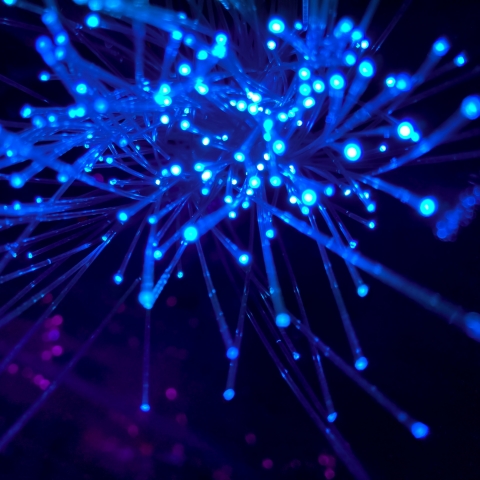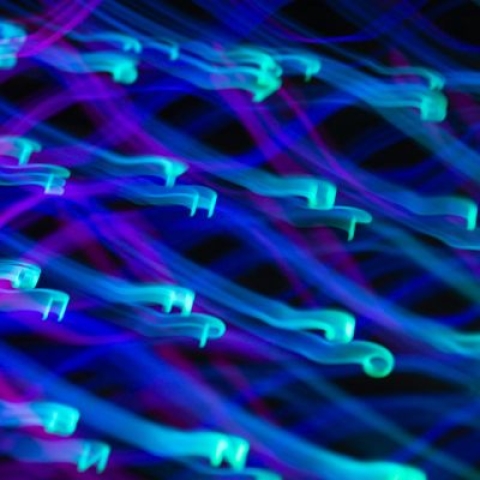
Quantum information technology covers a broad area of physics, taking advantage of phenomena such as quantum superposition, in which particles can be in different states at the same time, and quantum entanglement, where particles can be connected without any direct physical interaction.
Through our research, we're developing new technologies, including applications for high-precision measurements, exponential computational speed-up, and secure communication.
Quantum computers will help us solve complex problems much faster than supercomputers of today – or the future – with impacts for our security and make possible advances in machine learning and artificial intelligence.
Quantum sensors exploit quantum interference and/or entanglement, to achieve a higher sensitivity and resolution for biomedical, environmental, imaging and navigation applications. They can also be used to better test the fundamental laws of physics.
The development of quantum technologies will boost the quantum industry, and enhance the health and wellbeing of our society. It will also improve the security of government institutions, and the sustainability of our environment.
Our research is regularly published in international journals, such as Nature Journals, Physical Review Letters, New Journal of Physics, Physical Review A, Quantum Information Processing, and Optics Express.
Our work covers the following topics
- High-precision quantum sensing and imaging
- Quantum computing, boson sampling and quantum computational speed-up
- Quantum simulations of complex systems
- Quantum secure communication
Methods and facilities
Our work aims at the theoretical study of novel schemes for quantum technologies – and their experimental realisation toward the development of a quantum industry.
Along with a supercomputer facility in the ICG, facilities include a quantum optics lab including lasers, nonlinear crystals, optics and photon detectors, and a time-resolved photoluminescence system.
Collaborations and funders
Quantum information and sensing is one of the key areas of expertise at the Quantum Science and Technology Hub and benefit of the large network of international collaborations with leading institutions across four continents and of funding from both government and industry within the hub.
Recent projects have received funding from the United States Office of Naval Research (ONR), and the United States Army Research Lab (ARL). We have also collaborated with leading research institutions across 4 continents, including:
- Professor Mohammad Hafezi, University of Maryland College Park, U.S
- Professor Kurt Jacobs, U.S. Army Research Laboratory
- Professor Michał Karpiński, University of Warsaw, Poland
- Professor. Y.H. Kim, Pohang University of Science and Technology, South Korea
- Professor Frank Narducci, Naval Postgraduate School, Monterey, U.S
- Professor J.W. Pan, University of Science and Technology of China
- - Professor Ernst Rasel, Leibniz University Hannover Germany.
- - Professor Wolfgang P. Schleich, University of Ulm, Germany
- Professor Shih, University of Maryland, Baltimore
- Professor A. White, University of Queensland, Australia
Publication highlights include:
-
Scattershot multiboson correlation sampling with random photonic inner-mode multiplexing
Tamma, V. & Laibacher, S., 17 Apr 2023, In: The European Physical Journal Plus. 138, 9 p., 335.
-
Ultimate quantum sensitivity in the estimation of the delay between two interfering photons through frequency-resolving sampling
Triggiani, D., Psaroudis, G. & Tamma, V., 24 Apr 2023, In: Physical Review Applied. 19, 4, 14 p., 044068.
-
Distance sensitivity of thermal light second-order interference beyond spatial coherence
Pepe, F., Scala, G., Chilleri, G., Triggiani, D., Kim, Y-H. & Tamma, V., 1 Jun 2022, In: The European Physical Journal Plus. 137, 10 p., 647.
-
Heisenberg-limited estimation robust to photon losses in a Mach-Zehnder network with squeezed light
Gatto, D., Facchi, P. & Tamma, V., 20 Jan 2022, In: Physical Review A. 105, 1, 14 p., 012607.
-
Non-adaptive Heisenberg-limited metrology with multi-channel homodyne measurements
Triggiani, D., Facchi, P. & Tamma, V., 17 Jan 2022, In: The European Physical Journal Plus. 137, 13 p., 125.
-
Boson sampling with random numbers of photons
Tamma, V. & Laibacher, S., 7 Sept 2021, In: Physical Review A - Atomic, Molecular, and Optical Physics. 104, 3, 6 p., 032204.
-
Heisenberg scaling precision in multi-mode distributed quantum metrology
Gramegna, G., Triggiani, D., Facchi, P., Narducci, F. A. & Tamma, V., 10 May 2021, In: New Journal of Physics. 23, 8 p., 053002.
-
Heisenberg scaling precision in the estimation of functions of parameters in linear optical networks
Triggiani, D., Facchi, P. & Tamma, V., 3 Dec 2021, In: Physical Review A. 104, 10 p., 062603.
-
Typicality of Heisenberg scaling precision in multi-mode quantum metrology
Gramegna, G., Triggiani, D., Facchi, P., Narducci, F. A. & Tamma, V., 16 Feb 2021, In: Physical Review Research. 3, 1, p. 1-12 12 p., 013152.
Project highlights include
-
Multiphoton Quantum Sensing and Information Processing
Tamma, V. (2023)
-
Quantum optical networks for quantum technologies
Tamma, V. (2023)
-
Distributed Quantum Optical Sensing
Tamma, V. (2023)
Discover our areas of expertise
Quantum information and sensing technologies is one of 3 areas of expertise within our Physics research. Explore the others below.
Condensed Matter Physics
We're looking for solutions to issues around energy harvesting, efficiency and storage, medical technologies, security, and the environment. Explore our condensed matter physics research.

Quantum optics and quantum foundations
Our work in this area is studying the particle-like properties of photons, and wave-like behaviour of massive objects, such as electrons and atoms.

Research centres and groups
Quantum Science and Technology Hub
In our Quantum Science and Technology Hub (QSTH), we're studying quantum science and developing novel quantum technologies.

Applied Physics Research Group
We're exploring research in quantum information technologies, quantum optics and quantum foundations and applied advanced materials.

Interested in a PhD in Physics?
Browse our postgraduate research degrees – including PhDs and MPhils – at our Physics postgraduate research degrees page.


